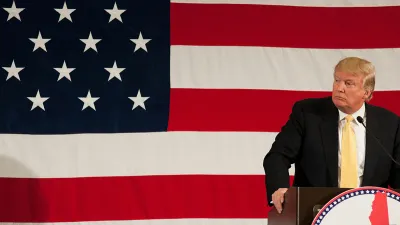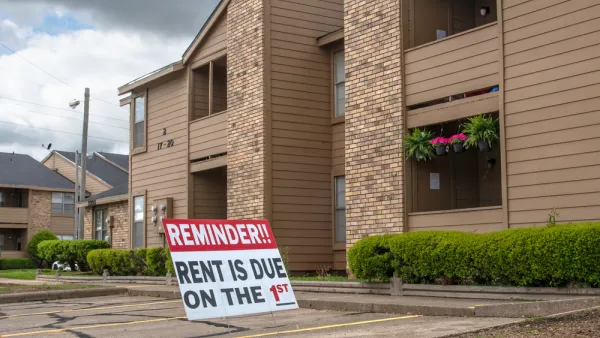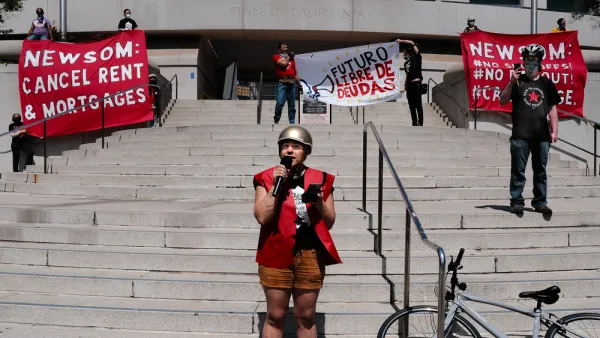President Trump put on a show while signing a batch of executive orders late last week, but on further evaluation, the president's signatures on these orders aren't likely to save anyone from the economic devastation of the coronavirus.

"President Trump took the unusual — and highly controversial — step Saturday of attempting to provide additional economic relief to millions of Americans on his own, without the approval of Congress," explains Heather Long of a news story that most readers are probably familiar with by now--about the president making a show of action as Congress failed to come to an agreement about a relief package, several months after the House approved the HEROES Act and even more after Congress approved the CARES Act.
President Trump signed four executive orders late last week while on the ground of his golf club in New Jersey, as explained by Long: "Trump announced he was postponing payroll taxes through the end of the year, extending the unemployment “bonus” at $400 a week (down from $600), helping people “stay in their homes” and waiving student debt payments through the end of 2020."
But the question remains about whether the executive orders will have a significant effect on the problems they are intended to address—that's the question Long and other writers this week have taken up after inspecting the executive orders. The details, according to Long, "are not as generous as he made them sound."
"He is ordering a payroll tax deferral, not a cut, meaning the taxes won’t be collected for a while but they will still be due at a later date. On housing, he instructs key officials to “consider” whether there should be a ban on evictions. He also insists that state governments pick up the tab for some of the unemployment aid."
The likelihood that lawsuits will also derail some of these measures is also very good, according to Long.
For Bloomberg CityLab, Kriston Capps focuses more directly on the extended eviction moratorium promised by President Trump, weeks after the federal government's previous eviction moratorium, for residents of public housing programs and facilities, expired in July.
"Yet Saturday’s executive order doesn’t renew the federal moratorium on evictions that expired in July. In fact, it doesn’t authorize any new action on evictions or foreclosures at all. Rather it instructs the leaders of several agencies, namely the U.S. Department of Housing and Urban Development, to look again at existing funds or options for protecting renters, without promising any specific relief.
Capps cites experts and advocates like Diane Yentel, the president of the National Low Income Housing Coalition, and Deborah Thrope, deputy director of the National Housing Law Project, to warn readers that a solution to the looming eviction crisis and pandemic depression is not found in president's recent executive orders.
FULL STORY: Here’s what is actually in Trump’s four executive orders

National Parks Layoffs Will Cause Communities to Lose Billions
Thousands of essential park workers were laid off this week, just before the busy spring break season.

Retro-silient?: America’s First “Eco-burb,” The Woodlands Turns 50
A master-planned community north of Houston offers lessons on green infrastructure and resilient design, but falls short of its founder’s lofty affordability and walkability goals.

Delivering for America Plan Will Downgrade Mail Service in at Least 49.5 Percent of Zip Codes
Republican and Democrat lawmakers criticize the plan for its disproportionate negative impact on rural communities.

Test News Post 1
This is a summary

Test News Headline 46
Test for the image on the front page.

Balancing Bombs and Butterflies: How the National Guard Protects a Rare Species
The National Guard at Fort Indiantown Gap uses GIS technology and land management strategies to balance military training with conservation efforts, ensuring the survival of the rare eastern regal fritillary butterfly.
Urban Design for Planners 1: Software Tools
This six-course series explores essential urban design concepts using open source software and equips planners with the tools they need to participate fully in the urban design process.
Planning for Universal Design
Learn the tools for implementing Universal Design in planning regulations.
EMC Planning Group, Inc.
Planetizen
Planetizen
Mpact (formerly Rail~Volution)
Great Falls Development Authority, Inc.
HUDs Office of Policy Development and Research
NYU Wagner Graduate School of Public Service





























